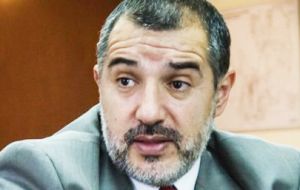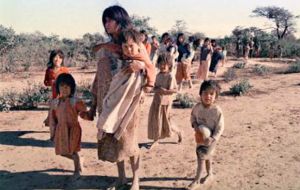MercoPress. South Atlantic News Agency
Four child malnutrition deaths in northern Argentina; another 1.800 in danger
 “We have 105,981 children with nutritional health monitored, but 1,800/1.900 children don’t have the ideal weight levels” said Salta Health Minister Villa Nougues
“We have 105,981 children with nutritional health monitored, but 1,800/1.900 children don’t have the ideal weight levels” said Salta Health Minister Villa Nougues  The two children that passed away in January, a 9 month infant and 2-year toddler both were part of the local indigenous Wichi community
The two children that passed away in January, a 9 month infant and 2-year toddler both were part of the local indigenous Wichi community Two new deaths of minors by malnutrition were uncovered in Argentina's northern province of Salta while the provincial health minister has acknowledged that 1.800 to 1.900 children are suffering from nutritional problems, suggesting the scourge may be more widespread than first thought, according to a report in the Buenos Aires Herald.
On Tuesday it was reported that a 9-month-old infant died from complications due to malnutrition, and since then Salta’s El Tribuno newspaper has received two more birth certificates for toddlers who died from complications caused by malnutrition in 2014.
This makes the total number of reported infant deaths due to malnutrition four so far, and many more may yet be discovered as more certificates appear.
“Historically we have 105,981 children whose nutritional health is monitored, but 1,800 to 1,900 children don’t have the ideal weight levels, and they are being monitored periodically by health services,” said Salta Health Minister Oscar Villa Nougues to El Tribuno.
In addition, the minister said that only 80 to 81% of toddlers between 0 and 5 years of age were receiving checkups in the public health system.
El Tribuno reporter Robustiano Pinedo, who has been investigating the issue for the past few years, told the Buenos Aires Herald that most of the deaths linked to malnutrition hail from indigenous families that live in remote areas of the province.
The two children that passed away in January — nine-month old infant Alan Mijael Villena, and two-year-old toddler Marcos Solís both were part of the local indigenous Wichi community and died in the same hospital in Orán, Salta.
The main factor leading to the deaths is that many indigenous groups do not have access to clean water as they live in remote regions that have are beyond the reach of the public drinking-water network. When a child suffering from malnutrition drinks contaminated water, it can lead to diarrhea, which affects them severely as they do not weigh enough to cope with the illness and loss of fluids.
On Monday, Salta's Under-secretary for nutrition-related illnesses, Dr. Gladys Pernas acknowledged that the provincial government lacked the necessary medical professionals to deal with the nutritional emergency occurring in the north of Salta. “We lack human resources. We lack personnel, many doctors are overworked, and are taking too many shifts,” said Pernas.
One of the key problems is communication between the indigenous communities and the health workers, as for many in the community their first language isn’t Spanish, said Pinedo. This problem is common in Chaco province also, where several infant malnutrition deaths have been reported in the last year.




Top Comments
Disclaimer & comment rules-

-

-

Read all commentsAnother example of the argie attempt to exterminate the last of the indigenous people, the real owners of the land.
Feb 05th, 2015 - 12:34 pm 0Check those figures. 1,800 to 1,900 children being monitored. But only 80% of toddlers being monitored. 2,400 defenceless children being ignored by argie 'authorities'. And they're malnourished. Of course they are. 'La Presidente' is busy giving their food away in exchange for military equipment!
malnutrition
Feb 05th, 2015 - 12:46 pm 0forget the Falkland's and feed your own people.
disagree with using such tragic incidents for political arguing but will link to recent similar incident in GB if asked.
Feb 05th, 2015 - 01:02 pm 0Commenting for this story is now closed.
If you have a Facebook account, become a fan and comment on our Facebook Page!